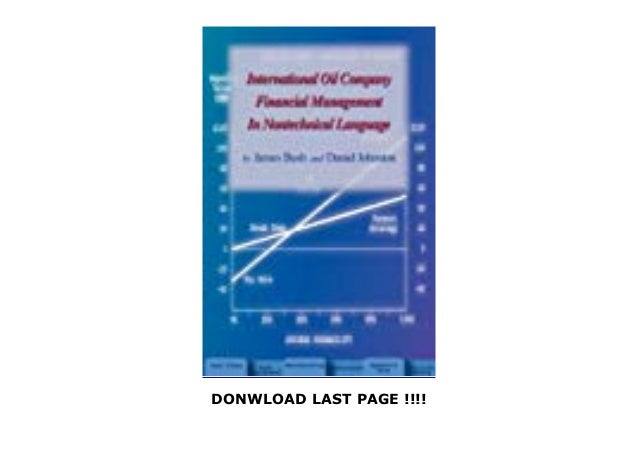- Corporate Financial Management Pdf
- Financial Management Lecture Notes Pdf
- Corporate Financial Management Pdf
Corporate Finance: Strategies for Value Creation (SVC)
Chapter 1 - An Overview of Financial Management. What is finance: cash flows between capital markets and firm’s operations. The goal of a firm. Forms of business organization. Intrinsic value and market price of a stock. Agency problem. Business ethics. Career opportunities in finance. An organization’s financial management plays a critical role in the financial success of a business. Therefore, an organization should consider financial management a key component of the. Financial Management has become a vital part of the business concern and they are concentrating more in the field of Financial Management. Financial Management also developed as corporate finance, business finance, financial economics, financial mathematics and financial engineering. Understanding the basic concept about the financial management. Explore how finance theory works in practice with Corporate Financial Management, 5th edition. Find out how financial decisions are made within a firm, how projects are appraised to make investment decisions, how to evaluate risk and return, where to raise finance from and how, ultimately, to. An organization’s financial management plays a critical role in the financial success of a business. Therefore, an organization should consider financial management a key component of the.
Course Number 1416
Fall; Q1Q2; 3.0 credits28 Sessions

Exam
This course is planning for a Hybrid Classroom approach in Fall 2020. Look for additional details on Canvas at term start.
Qualifies for Management Science Track Credit
28 Sessions
Exam
Qualifies for Management Science Track Credit
Corporate Financial Management Pdf
Career Focus
This course provides a general management perspective on corporate finance and is designed to improve your ability to create value. It should appeal to students who want to work as finance executives within organizations (both for-profit and non-profit); as strategy consultants or investment bankers who advise organizations; or as private equity, public equity, venture capital, or hedge fund investors. The course should also appeal to students who simply want to deepen their understanding of corporate finance in a range of topics and settings not covered in the required curriculum courses.
Educational Objectives
The goal of the course is to provide students with the knowledge, skills, and judgment required to make good investment, financing, and operating decisions. The course emphasizes the development of practical insights rather than formal theories. We will refine and extend the analytical tools covered in RC Finance 1 and 2 and apply value-based management techniques to a broad set of business decisions.

Course Content and Organization
Most class sessions will be case-based. While the Fall and Spring versions of the course will utilize many of the same cases and cover many of the same topics, each will have a different emphasis.
The Fall version of the course emphasizes the activities performed by the chief financial officer (CFO). This focus intends to expose you to what these activities are, to engage you in rich discussions about the key considerations behind fundamental choices CFOs face, and to teach you financial decision making frameworks and processes that firms often use. The key modules include
- Measuring and Driving Performance
- Managing Funding Sources and Cash
- Managing Risk
- Managing Investment

In the Fall version, we will have numerous guests over the course of the semester, most of whom are CFOs and HBS graduates. In addition to hearing from several case protagonists, we will be joined by CFOs who are subject matter experts on topics we will discuss. In the past, guests have included Amy Hood, CFO of Microsoft; Eleanor Laurans, CFO of Boston Public Schools; Doug Maine, former CFO of MCI and IBM; Jonathan Mariner, former CFO of Major League Baseball; Byron Pollitt, former CFO of Visa; Helen Riley, CFO of Google X; Robert Ryan, former CFO of Medtronic; Dhivya Suryadevara, CFO of GM; Scott Ullem, CFO of Edwards Lifesciences, and several other current or former CFOs and CEOs. We will use part of our time with these guests to discuss their career paths and explore career options.
The Spring version of the course will place more emphasis on strategic analysis-the financial implications of major strategic decisions. It will utilize more strategy concepts (creating and sustaining competitive advantage, managing competitive interactions, etc.) than a typical RC Finance class, and will utilize more financial concepts (measuring value, assessing risk, and analyzing cash flows) than a typical RC Strategy class. In short, it is designed to teach a set of quantitative tools (microeconomics of supply and demand curves, the strategic value of optionality, and the concept of price elasticity) that can help guide important strategic decisions. In the end, the goals are to improve your financial acumen, deepen your strategic thinking, and unify the knowledge you’ve learned across multiple functional silos. The key modules include:
- Understanding Value Drivers
- Creating Competitive Advantage (Profitability)
- Sustaining Competitive Advantage
- Driving Profitable Growth
- Financing Profitable Growth
Corporate Finance book is one of the important books for MBA Students. This book covered most of the syllabus related to the Corporate Finance. Corporate Finance book is also useful to most of the students who are preparing for Finance related exams. Verify the links below to download Corporate Finance book in Pdf format.
Click Here To Download (Link -1)Click Here To Download (Link -2)Check the above links to download Corporate Finance Book in Pdf Format.
